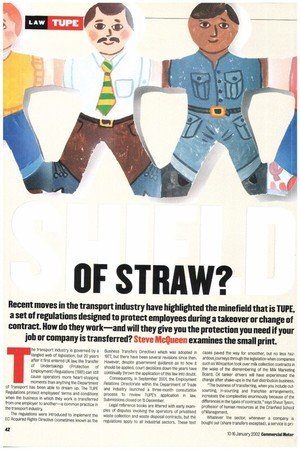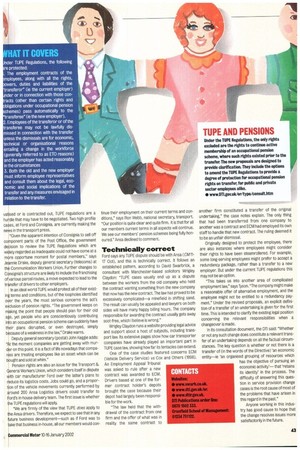OF STRAW?
Page 42

Page 43

If you've noticed an error in this article please click here to report it so we can fix it.
Recent moves in the transport industry have highlighted the minefield that is TUPE, a set of regulations designed to protect employees during a takeover or change of contract. How do they work—and will they give you the protection you need if your job or company is transferred? Steve McQueeh examines the small print.
The transport industry is governed by a tangled web of legislation, but 20 years after it first entered UK law, the Transfer of Undertakings (Protection of Employment) Regulations (1981) can still cause operators more heart-stopping moments than anything the Department of Transport has been able to dream up. The TUPE Regulations protect employees' terms and conditions when the business in which they work is transferred from one employer to another—a common practice in the transport industry.
The regulations were introduced to implement the EC Acquired Rights Directive (sometimes known as the Business Transfers Directive) which was adopted in 1977, but there have been several revisions since then. However, despite government guidance as to how it should be applied, court decisions down the years have continually thrown the application of this law into doubt.
Consequently, in September 2001, the Employment Relations Directorate within the Department of Trade and Industry launched a three-month consultation process to review TUPE's application in law. Submissions closed on 15 December.
Legal reference books are littered with early examples of disputes involving the operators of privatised waste collection and waste disposal contracts, but the regulations apply to all industrial sectors. These test cases paved the way for smoother, but no less hazardous journeys through the legislation when companies such as Wincanton took over milk collection contracts in the wake of the dismembering of the Milk Marketing Board. Oil tanker drivers will have experienced the change after shake-ups in the fuel distribution business.
"The business of transferring, when you include outsourcing, in-sourcing and franchise arrangements, increases the complexities enormously because of the differences in the types of contracts," says Shaun Tyson, professor of human resources at the Cranfield School of Management.
Whatever the sector, whenever a company is bought out (share transfers excepted), a service is pn vatised or is contracted out, TUPE regulations are a hurdle that may have to be negotiated. Two high profile caSes, at Ford and Consignia, are currently making the nefrs in the transport press.
1"Given the apparent intention of Consignia to sell off coMponent parts of the Post Office, the government decision to review the TUPE Regulations which are widely regarded as inadequate could not have come at a more opportune moment for postal members," says Jeannie Drake, deputy general secretary (telecoms) at the Communication Workers Union. Further changes to Cc)nsignia's structure are likely to include the franchising of various parcel routes, a move expected to lead to the transfer of drivers to other employers.
In an ideal world TUPE would protect all of their existing terms and conditions, but of the loopholes identified over the years, the most serious concerns the act's eiclusion of pension rights. "The government keeps on making the point that people should plan for their old age, yet people who are conscientiously contributing in0 an occupational pension scheme can suddenly have tlieir plans disrupted, or even destroyed, simply
b13cause of a weakness in the law," Drake warns. Deputy general secretary (postal) John Keggie adds: "t the moment companies are getting away with murder on this point. It is a fact of life nowadays that compares are treating employees like an asset which can be bought and sold at whim."
Pension rights are also an issue for the Transport & General Workers Union, which considers itself in dispute with car manufacturer Ford over the latter's plans to reduce its logistics costs. Jobs could go, and a proportion of the vehicle movements currently performed by 4round 200 Ansa Logistics drivers could transfer to Ford's in-house delivery team. The first issue is whether !le TUPE regulations will apply.
i "We are firmly of the view that TUPE does apply to he Ansa drivers. Therefore, we expect to see that in any future business development—such as if Ford was to take that business in-house, all our members would con
tinue their employment on their current terms and conditions," says Ron Webb, national secretary, transport. "Our position is quite clear and quite firm. It is that for all our members current terms in all aspects will continue. We see our members' pension schemes being fully honoured." Ansa declined to comment.
Technically correct
Ford says any TUPE Orspute should be with Ansa (CM1117 Oct), and this is technically correct. It follows an established pattern, according to David Swarbrick, a consultant with Manchester-based solicitors Wrigley Claydon: "TUPE cases usually end up as a dispute between the workers from the old company who held the contract wanting something from the new company that now has the new contract. The law has proved to be excessively complicated—a minefield in shifting sand. The result can usually be appealed and lawyers on both sides will have many happy billing hours. The company responsible for awarding the contract usually gets away scot-free, which I believe is wrong."
Wrigley Claydon runs a website providing legal advice and support about a host of subjects, including transport law. Its extensive pages show how car transporter companies have already played an important part in TUPE case law, showing how far its tentacles can extend.
"The law held that the withdrawal of the contract from one firm and the offer of what was in reality the same contract to another firm constituted a transfer of the original undertaking," the case notes explain. The only thing that had been transferred from one company to another was a contract and ECM had employed its own staff to handle that new contract. The ruling deemed it to be an unfair dismissal.
Originally designed to protect the employee, there are also instances where employees might consider their rights to have been steamrollered. For example, some long-serving employees might prefer to accept a redundancy package, rather than a transfer to a new employer. But under the current TUPE regulations this may not be an option.
"TThis takes us into another area of complicated employment law," says Tyson. "The company might make a reasonable offer of alternative employment, and the employee might not be entitled to a redundancy payment." Under the revised proposals, an explicit definition of a transfer of an undertaking is given for the first time. This is intended to clarify the existing legal position concerning the relevant responsibilities when a changeover is made.
In its consultation document, the DTI said: "Whether or not any such change does constitute a relevant transfer of an undertaking depends on all the factual circumstances. The key question is whether or not there is a transfer of (in the words of the Directive) 'an economic entity—le 'an organised grouping of resources which has the objective of pursuing an economic activity—that 'retains its identity' in the process. The difficulty of answering this question in service provision change cases is the root cause of most of the problems that have arisen in this regard in the past."
Anyone working in this industry has good cause to hope that the change resolves issues more satisfactorily in the future.
















































































































































